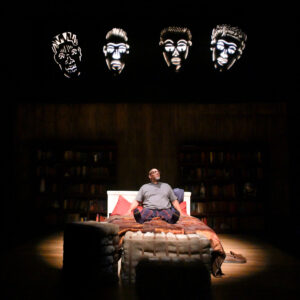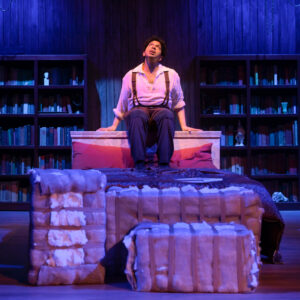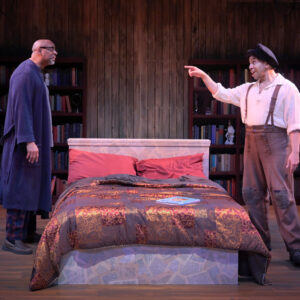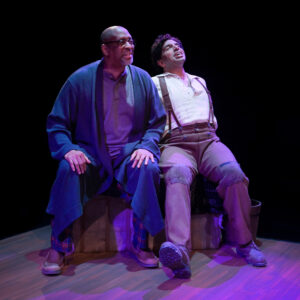Blue Door
Tanya Barfield
Aurora Theatre Company

Like Charles Dickens’ Ebenezer Scrooge, Lewis heads to bed, soon to toss and turn and to spend a night confronted by the ghosts of his life – in his case, direct-line ancestors stretching over a hundred years. As one ghost announces, “This is a summoning” for this distinguished, Black, mathematics professor who before daybreak will confess to himself and to this long line of ghosts, “I don’t know who, where, or why I am.” After all, his white wife of twenty years recently left him after he refused to attend the Million Man March; he is on a forced sabbatical for getting into a n-word-calling duel with a sassy Black student; and his own brother (dead but quite alive in his dreams this night) says, “My brother is afraid to be Black … He’s a white devil in a Black skin.”
With tour de force performances by its cast of two and directed with boldness and compassion by Darryl V. Jones, Aurora Theatre Company presents Tanya Barfield’s Blue Door in a play where a man’s search for the core of his true identity requires him to confront his own collective history – a history not unlike the millions of other Black men like him in the U.S. The question he must try to resolve as man who has prided himself in succeeding in the white world of academia is at what cost has his success been to his Blackness, to his core being.

Lumbering about his bedroom with its wall of books behind him (Hector Zavala scenic designer), Michael J. Asberry brings a combination of stunned puzzlement, academic inquisitiveness, and self-aimed humor to his Lewis who is trying to explain to us and to himself why his wife actually left him. Replaying their conversation as he voices both herself and himself the day she suddenly announced their divorce, Lewis remembers her saying, “There’s a story to a person’s life,” and if a person – that is, he – “compartmentalizes” himself, “he is not a total person.” Chuckling that maybe it was due to his wife’s recent reading a book about feng shui – the Chinese tradition of harmonizing one’s life with one’s surroundings – Lewis snuggles under covers noting with premonition, “I have a sense I am being watched.”

What follows is a night of both dreams and nightmares that send Lewis traveling through three generations of the men before him, rising in his own sleepwalking often to watch with fascination, to interact with fondness, and to confront with indignation and even anger. With stunning versatility of voice, accent, gender and age depiction, demeanor, and societal/racial status, James Mercer II roams in and out of Lewis’ nighttime wanderings as his enslaved great-grandfather Simon, his reformation and turn-of-the century grandfather Jesse, and his deceased brother Rex – along with several dozen others who were part of all those lives.

The stories told are a panoramic unfolding of the struggles, the heartaches, the injustices, and the much-worse – including horrendous torture and death – that Lewis learns are his heritage. The stories run the gamut from family members cruelly separated by being sold by callous slave owners, a boy’s memories of six ghosts (i.e., men in sheets) showing up with their threats in the middle of the night, a young man on a chain gang for ten years for sleeping in a white church, and a town of cheering whites watching the indescribable death of a man who only wanted to register to vote. The power of these stories and their constant weaving in and out of reality is greatly accentuated through the creatively crafted lighting design of Stephanie Anne Johnson and the stirring sound effects designed by Ray Archie.
Lewis himself fills in the paternal gap of the three generations by assuming the role of an alcoholic father whom he has not spoken to in years and whose recent funeral he did not attend. Memories of a father’s physical and verbal abuses through the years explode into his mind’s eye, with Michael J. Asberry providing gripping, heart-breaking depictions as Lewis becomes the father he comes to detest.
But also revealed to Lewis during this night of sometimes horror are the deep love of family, the caring sacrifice to protect loved ones, and the brave acts to assert and attain basic human rights that intertwine all the troubles of each preceding generation. The voices of a mother soothing her scared son and an ecstatic bride about to jump the broom or of a boy learning to read the book that is forbidden for him to hold and a young man out to explore his freedom in hobo style paint pictures that begin to awaken Lewis to the many other aspects of himself that he has long overlooked and maybe even denied.
Passed from one generation to the next is the tradition of painting a door blue. Based on the Gullah culture of South Carolina, family members about to leave, be sold, or die paint a door to keep the bad spirits out and the good warmth and memory of a family’s love, in.

Linking the years, the people, and the emotions of the night’s many revelations are a soundtrack of original songs by director Darryl V. Jones – songs reflecting the hardships of enslavement, the abandonment of imprisonment, and the fortitude to survive on a chain gang. James Mercer sings many of the songs with notes achingly haunting, soothingly mesmerizing, fiercely defiant. Lewis connects most visibly and emotionally to his past when Michael Asberry lends his deep, resounding vocals to a duet with one generation or another; but it is when he joins his brother’s ghost in a final, moving duet that his Lewis finally comes to some catharsis between his present self and all his rich and often troubled past.
The ninety minutes (no intermission) of Aurora Theatre Company’s compelling and captivating Blue Door by Tanya Barfield does not have the “Happy Christmas to All” ending that Dickens gives his Scrooge. However, as we exit, we as the witnesses of one Black man’s look into the mirror of his soul leave with a sense of the awesome power and magic of theatre to reflect deep personal growth and at least the beginning of needed reconciliation.
Rating: 4.5 E
A Theatre Eddys Best Bet Production
Blue Door continues through May 19, 2024 in a live, ninety minute (no intermission) performance by Aurora Theatre Company, 2081 Addison Street, Berkeley, CA. Performances will also be available in streamed fashion, May 14-19. Tickets for live and streamed performances are available online at https://www.auroratheatre.org or by calling the Box Office at 510-838-4822.
Note: Masks are required for live performances for Wednesday evening and Sunday matinee performances.
Photo Credits: Alessandro Mello
